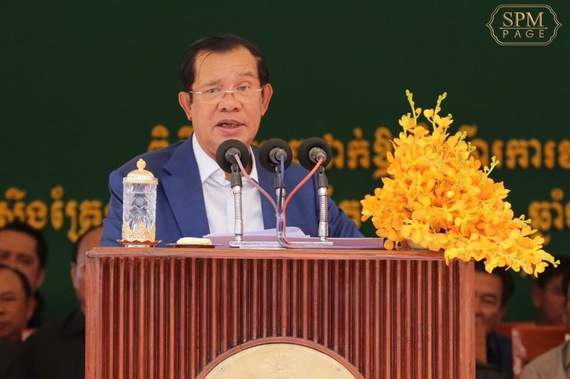Cambodia will celebrate the 30th anniversary of the Paris Peace Agreement (PPA) on October 23, 2021. Many foreign embassies in Cambodia are enthusiastic about commemorating the 30th anniversary of the PPA. The Cambodian government will also commemorate the 30th anniversary of the Paris Peace Agreement, despite the fact that it was removed from the government's list of national holidays.
As a matter of face the treaty has been in force for thirty years, scholars around the world and the Cambodian government continue to interpret it differently. The Cambodian government believes that the main meaning of the PPA has already been incorporated into Cambodia's constitution, and that it is no longer necessary to follow everything in the PPA except the constitution.
In this case, a question that has been raised frequently in Cambodia is whether UNTAC succeeded or failed in its mission in Cambodia.
In terms of its mandate, the resources allotted to it, and the challenges it faced, UNTAC can be considered a qualified success. The organization and conduct of the election (which was free and fair, though the election campaign was not), the refugee repatriation program, and the promotion (but not protection) of human rights were all clear victories. Special mention should be made of UNTAC's Electoral Component and UNHCR as examples of what the UN can accomplish with adequate resources and planning. In particular, the Electoral Component should serve as a model for future UN electoral missions.
The majority of UNTAC's other responsibilities were successfully completed. It confirmed the Vietnamese withdrawal, assuaging Chinese and American concerns. It cantoned and disarmed the military forces it was granted access to. It started the rebuilding of Cambodia's infrastructure, administration, and economy. It employed 50 000 Cambodians, who gained valuable skills that can be put to use in the reconstruction and development of the country.
On a more fundamental level, UNTAC established the foundations of a civil society, leaving Cambodia with a more open political process, a freer press, and a more politically aware population than when it arrived. It left a democratically elected legislature and a coalition government of the country's three most popular political parties in place of an unelected regime imposed on the country by a foreign power.
In terms of UNTAC's overall performance, key elements of the operation demonstrated creativity and flexibility at critical times, demonstrating the positive side of the improvisation that has characterized UN peacekeeping operations since their inception. When problems arose, the UNHCR changed its repatriation plan. With the approval of the Security Council, UNTAC effectively amended the Paris Accords by holding the election without the required 70% disarmament and cantonment. When cantonment and disarmament did not occur, the pattern of military deployments was changed to allow the Military Component to protect the electoral process and enhance security throughout the country. UNTAC also avoided some of the previous and concurrent peacekeeping operations' failures. It largely maintained its impartiality, suffered no catastrophic administrative disasters, and came in under budget by avoiding a shooting war with a recalcitrant party, using force only in self-defense and even then with great restraint.
The de-internationalization of the Cambodian conflict, another unspoken strategic goal of the Paris Accords, was also achieved. Chinese disengagement was aided in part by UNTAC’s refusal to engage in armed conflict with the Khmer Rouge and because it acted impartially enough to maintain and even increase Chinese support for the peace process. Cambodia's neighbors, including China, will continue to be interested in its internal affairs, and some, like Thailand and Vietnam, will continue to interfere, but UNTAC successfully resolved a long-standing international dispute over Cambodia's UN seat. For the first time since the 1970s, it aided in the installation of an internationally recognized and recognizable Cambodian government, paving the way for Cambodia to reclaim its rightful place in a number of international organizations, including ASEAN and the newly established ASEAN Regional Forum (ARF).
The Paris Accords, on the other hand, were undeniably unsuccessful in bringing peace to Cambodia. The responsibility for this situation falls squarely on UNTAC's shoulders. Its major failures in implementing the Accords were:
1. Its inability to control and supervise the State of Cambodia (SOC) Administration;
2. Its unwillingness to deal forcefully with human rights violations, particularly because it has refused to establish a system of justice to deal with the most egregious of these;
3. Its management failures, including poor inter-component coordination and cooperation.
The following aspects of UNTAC's performance were not entirely within its control but could have been improved: (1) the lateness of its deployment and installation; (2) its strategic planning; (3) the poor performance of its Civilian Police (CivPols); (4) the initial neglect of the adverse economic effects of its own presence; and (4) the slowness of its rehabilitation and de-mining programs. It's worth noting that UNTAC's greatest successes came in areas where it had the most independent control and latitude, i.e., areas where it didn't need the full cooperation of all factions to be effective. Its major setbacks occurred in areas where it was subjected to the whims of its Cambodian peace partners.
……………………………….
( Dr. Seun Sam is a researcher at the Royal Academy of Cambodia).






